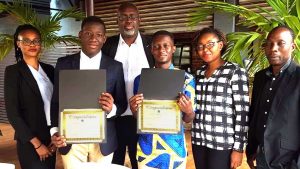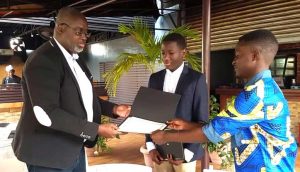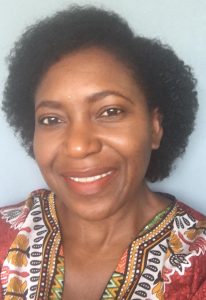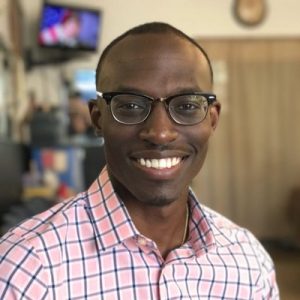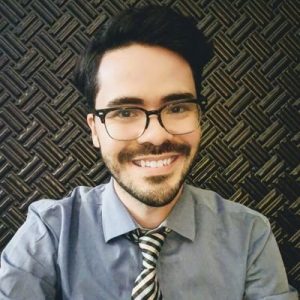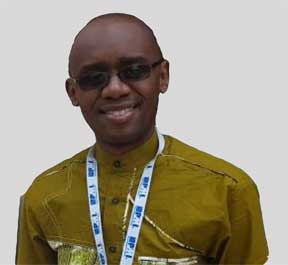 ABOUT THE STEM DRC INITIATIVE:
ABOUT THE STEM DRC INITIATIVE:
See StemDRC.org for the latest news
SMIN Power Group LLC is leading a STEM DRC Initiative to promote STEM education in the Democratic Republic of the Congo. The STEM DRC Initiative has one main goal: To encourage students in the Democratic Republic the Congo to become innovators, educators, and leaders in the Science Technology Engineering and Math (STEM) fields so that they can find solutions to the challenges we face in DRC and Africa. A List of Partners and Projects is Coming Soon!
CURRENT WORK FOR THE STEM INITIATIVE
The 2018 Ngalula Mubenga scholarships for STEM education have been awarded to Mr. Bolia, who is studying polytechnique at the University of Kinshasa #unikin and to Mr. Claude, who is studying science and technology at the Loyola University in Congo @ULCongo and planning to study renewable energies.
General Counsel, Dr. Madimba KADIMA-NZUJI presented The STEM Scholarship Certificates at a ceremony in the Democratic Republic of the Congo as shown below.
Dr. Ngalula Sandrine Mubenga, PE, and CEO of SMIN Power Group LLC established the scholarships to encourage and help further the education of Congolese students studying Science, Technology, Engineering or Mathematics.
STEM Initiative Members
Karine Ndjoko Ioset:
Karine Ndjoko Ioset is a circulating brain between Switzerland, Germany and DR Congo. She
is a Professor of analytical chemistry at the University of Lubumbashi and General Manager
of the Excellence Scholarship Program named BEBUC (Bourse d’Excellence Bringmann aux
Universités Congolaises), a partnership involving the University of Würzburg (Germany), 16
Congolese universities and 9 schools (http://www.foerderverein-uni-kinshasa.de/).
She earned her MSc and PhD degrees in Switzerland, from the Universities of Neuchâtel and
Lausanne, respectively. She accomplished a post-doctorate stay in Copenhagen (Denmark).
She specialized in nuclear magnetic resonance, hyphenated and separation techniques applied
to natural products chemistry. She has led the Analytical Service of the School of
Pharmaceutical Sciences at the University of Geneva (Switzerland) for twelve years. At this
position, she brought analytical solutions to international companies (Novartis, Nestlé,
Boerhinger Ingelheim and more), supervised MSc and PhD works, and taught hyphenated
techniques to students from all over the world. She holds 50 publications, two book chapters
and two scientific prizes (Alfred Vogel Award and Swiss Chemical Society). At the
University of Lubumbashi, she teaches since 2015 and contributes in building a new
curriculum in chemistry.
Since 2009, Karine Ndjoko Ioset has invested her academic and research expertise to
implement a platform with innovative practices and policies enabling BEBUC scholars to
build their curricula and become young skillful professors of tomorrow urgently needed in
DRC. The renewal of the over-aging Congolese academic staff is the main objective of
BEBUC. Karine Ndjoko Ioset has brought ideas to actions and political awareness on the
fundamental necessity to sustain higher education through South-South partnership, to
construct Africa-relevant research projects, to support young people, women in particular. As
a female scientist, she inspires girls and women to pursue a career in STEM. She organizes
woman seminars to guide them in their career, to overcome the barriers, to boost their
visibility and to foster their leadership. With ca. 190 young academics, 34% of women and
the first 8 already nominated professors in the Congo, BEBUC forms a kinship of scientists
evolving at universities all around the world. BEBUC fosters women inclusion, nurtures
excellence, integrity, leadership, and international cooperation.
Clarisse FALANGA:
Born in Kinshasa, September 11, 1986, Clarisse FALANGA performs her primary studies at Malamba and St. Joseph/Bonsomi schools, then continued secondary studies at the Jesuit Bonsomi College, where she graduated with a degree in Chemistry-Biology (biochemistry) in 2004.
After this, driven by this flame of excellence, the young thirty-something finds her way by enrolling in the Faculty of science of the University of Kinshasa where she got her Bachelor’s degree in molecular biology with the mention “Distinction” in 2009. Research work was done on the suitability of different imported hair creams and the texture of the frizzy hair of African women in 2010. Findings led to the development of a hair cream which she called Miravella Hair Cream.
In 2012, Clarisse FALANGA was named Assistant Manager of education at the University of Kinshasa Faculty of Science/Department of biology.
Continued studies in different areas of training was always in scientific research. She works in collaboration with the Department of biotechnology and molecular biology to the General Commissariat in the Atomic Energy of Kinshasa (CGEA/CREN-K) in the field of plant breeding and Mutations-induced.
In 2018, after 8 years of extensive research, the talented young woman receives a Patent of Invention, a certificate for the Protection of the mark, a trophy of excellence Strong Ladies and a certificate of appreciation to UN women for distinction in innovation for the invention of Miravella Hair Cream. That same year, she was also promoted as Chief of works at the Department of biology of the University of Kinshasa. Clarisse FALANGA is now working on a master’s degree, and is conducting research in several laboratories.
Apart from scientific qualities mentioned above, Clarisse FALANGA is an expert in event organization and in this capacity she created Celebra Pecunia, a performance platform. This bright young lady is also a member of the Women Leaders in Democratic Republic of Congo.
Through these research, Clarisse FALANGA faces a range of challenges. The first is financial. Due to the lack of funding, she was forced to self-fund her research by any means possible. The second is psychological that patients are affected by the appearance of their hair. They know a mental block and are not allowed to talk about the real causes of the loss of their hair, because it is often linked to their social life, or even conjugal intimacy. A third problem is that Clarisse FALANGA has a duty to not only bring the women to accept the state of defeat but more, accept that their fall could lead to a solution. The last difficulty is related to the impatience of patients in the process of hair growth. Most of the patients very quickly want to have results forgetting the causes or the number of years during which they suffer from these hair conditions. This situation puts our star of science in the role of inviting the women not only to be patient but especially to respect the limits as to how improved hair can impact their mental health.
Experience that Clarisse FALANGA has acquired in all of her research provides a way to motivate youth to demonstrate determination and inner energy against the obstacles of life. She invites women in general and the girl in particular, often marginalized, stifled, and living in the periphery to never give up in terms of socio-cultural stereotypes. She encourages youth to fight, find a space and to impose an identity in society despite obstacles and pain that litter the the life course of young ladies who could be future leaders.
The research undertaken by Clarisse FALANGA was intended to solve a thorny problem of public health that is disturbing the young women and by extension the population. These studies will revolutionize and contribute to the regulation of the industry of cosmetics in the Democratic Republic of Congo but more, they will raise international awareness of women about how to practice good maintenance of their hair, and appearance. In the near future, this Invention will be certified, a research laboratory will be established to support her thesis, and to invest in coaching so many young girls and women in science that can serve the company and the people of the DRC.
Doctor Kevin Ileka:
Dr. Ileka Graduated from the University of Michigan in the USA.
There, he earned a PhD in Chemistry.
He is a native of the DRC.
Dr. Ileka works as a Process Analytical Chemist at Bristol-Myers Squibb.
Dr. Philip Rodenbough
Philip Rodenbough is an interdisciplinary scholar interested in scientific writing, science pedagogy, and global development. His projects on global chemistry education have won funding from the Materials Research Society Foundation, and his writing and research have appeared in Polity ZA, In On Africa, InChemistry, RightsViews, Metro, Angewandte Chemie, The Journal of the American Ceramic Society, Crystal Growth & Design, and the Journal of Chemical Education, among other outlets.
At New York University Abu Dhabi (NYUAD), Philip founded and manages the Scientific Writing Program, which helps graduate students and postdocs to compose scientific manuscripts of the highest quality. His official appointment is as Graduate STEM Lecturer of Writing with the Graduate and Postdoctoral Programs Office, with an affiliation to the NYUAD Writing Center. Philip was previously a postdoc at NYUAD and The American University in Cairo. He earned his undergraduate degrees from the University of Washington, and his PhD in materials chemistry from Columbia University in the City of New York.
Philip was granted a Fulbright U.S. Scholar Award for the 2018/2019 academic year, to work on science education with the University of Kinshasa on-site in the Democratic Republic of the Congo. While on Fulbright fellowship leave from NYUAD, he continues to manage its Scientific Writing Program remotely
Philip Rodenbough is an interdisciplinary scholar interested in scientific writing, science pedagogy, and global development. His projects on global chemistry education have won funding from the Materials Research Society Foundation, and his writing and research have appeared in Polity ZA, In On Africa, InChemistry, RightsViews, Metro, Angewandte Chemie, The Journal of the American Ceramic Society, Crystal Growth & Design, and the Journal of Chemical Education, among other outlets.
At New York University Abu Dhabi (NYUAD), Philip founded and manages the Scientific Writing Program, which helps graduate students and postdocs to compose scientific manuscripts of the highest quality. His official appointment is as Graduate STEM Lecturer of Writing with the Graduate and Postdoctoral Programs Office, with an affiliation to the NYUAD Writing Center. Philip was previously a postdoc at NYUAD and The American University in Cairo. He earned his undergraduate degrees from the University of Washington, and his PhD in materials chemistry from Columbia University in the City of New York.
Philip was granted a Fulbright U.S. Scholar Award for the 2018/2019 academic year, to work on science education with the University of Kinshasa on-site in the Democratic Republic of the Congo. While on Fulbright fellowship leave from NYUAD, he continues to manage its Scientific Writing Program remotely.
Danny BYABENE CHABWINE, PMP®
Danny was born in Bambu-Mines, a small locality near Bunia, in the current Ituri Province in DRC forty years ago. His father was working as a psychologist for the then Big Gold Mining parastatal company Office des Mines d’Or de Kilo Moto (OKIMO) before moving from north to south, from Gold to Copper in Katanga region, where he joined Gecamines. Danny completed his primary education at the “then” prestigious Gecamines’ owned Maadini Primary School. Inspired by Japan and SciFi movies (initial STEM call?), Danny joined the most famous Technical Secondary school in the region, Institut Technique de Mutoshi in Kolwezi, also belonging to Gecamines. The ethnic crisis in the 90s forced the family to move to Bukavu in South Kivu for security. Danny then joined the Jesuits college Alfajiri where he completed his secondary studies in Bio-Chemistry with Distinction.
Keeping his dream of engineering studies, he enrolled in the Polytechnic Faculty of the University of Kinshasa in 1999. Despite passing his preparatory year, he decided to join the brand new department of Computer Sciences in the newly renamed Mathematics and Informatics Department in the Faculty of Sciences. In April 2006, he completed his Bachelor Degree in Computer Sciences with “Grande Distinction”.
Professionally speaking, Danny started as a Telecom Engineer with Chinese Giant Huawei Technologies in early May 2006 before moving in 2011 to the Indian Group Bharti Enterprises. He worked at Centum Learning, the training branch in DRC, Congo Brazzaville, Gabon and Madagascar as Training Consultant, and then moved to the Infrastructure branch, Africa Towers DRC and Gabon. Later he joined the Telecom operator Airtel DRC as Head of Project Management Office and Executive Assistant to the Managing Director. Today, Danny is heading the Supply Chain Management Department of Airtel DRC.
Danny is a certified Project Management Professional (PMP). He is keen to give back to his community and his profession by volunteering with the Project Management Institute. He has been co-founding member of the DRC Chapter and is current President of the Chapter Board. He is Associate Partner of the Academy of Science and Technology (ASCITECH), a newly established school promoting STEM in its curriculum from Kindergarten to University. Danny is also Founding Partner of the Consular school ABC in Bujumbura.
Danny is a happy husband to Nancy and father to Malkiya and Imani.
Information about other DRC STEM Initiative partners, coming soon.
